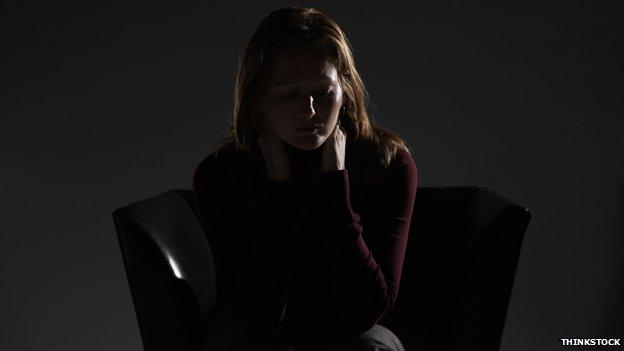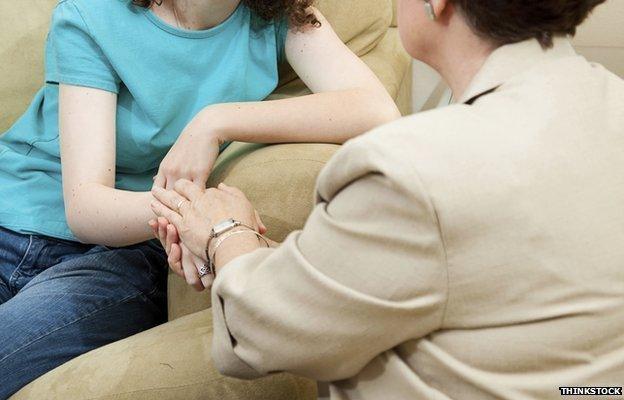People with learning disabilities 'targeted by groomers'
- Published

Young women with learning disabilities need support so they can keep themselves safe
As police chiefs and disability groups warn people with learning disabilities are at risk of being targeted by groomers, "Sarah" tells her story.
It's a gorgeous warm evening in the South West of England and Sarah - not her real name - has a date. She's wearing a summery skirt and top. She's strikingly pretty.
In her 20s Sarah, who has learning disabilities, left home to have her first taste of independence. She moved into a flat - the council call it supported living - where there was help on hand during the day. It was a big step for her.
When a man who lived in another flat and also has learning disabilities asked Sarah out, she was excited. She says she "wanted something happy to happen".
"He took me out for meals sometimes. He even wanted to get married to me or I wanted to get married to him," she explains, "he even proposed to me twice in one evening in two different clubs."
But Sarah explains that while he was nice to her in public, when they were alone together in his flat he could be unkind, shouting at her and throwing things.
Sarah's family became worried that her new boyfriend was controlling her and her mother noticed she had bruises.
One of the hardest things for Sarah was navigating their sexual relationship. She says sometimes she felt she had to be intimate with her boyfriend, even when she didn't want to.
"We would be going to bed and having this and that and when I would say can you get off please or I don't feel like it, he would say don't you love me, and make me feel guilty," she says. "And then when we were having our session sometimes my head would bang on the wall and my mum saw lots of bruises and when I was having a bath in his flat he would want to take pictures."
She says she thought she was in love and feels he played on her emotions, even though he, too, had a learning disability.
Sarah didn't want to tell her mother everything that was happening, because she was afraid she would get into trouble. Her boyfriend said her family didn't want her to be happy and, feeling as though she was "in a trance", she ignored her family's warnings.
Sarah's mother "Chrissy" asked social services and the police for help, but they said they couldn't really do anything because Sarah was an adult.
"All the way through the supported living whenever we had reviews, I'd say, 'she needs help with relationships,'" Chrissy explains. "But the reply was always that's she's an adult and that she's got her own choices to make."
Respond, external is a therapy and advocacy charity for people with learning disabilities who've experienced abuse or trauma. Chief executive Dr Noelle Blackman says the welcome move away from living in institutions or care homes, to independent living, carries risks.
"We want people to live normal, ordinary lives, but the way that we do that is actually by providing very little support. You find people with learning disabilities who have difficulty in keeping themselves safe, given two or three hours of support a week," she says.
She says that people with learning disabilities are often living in blocks of flats in gang areas. "It's like walking around with a label saying 'I'm a vulnerable person'. We're in danger of being neglectful and not making sure that we're helping people to live safely."
Chrissy had to wait for Sarah to cry for help, and one night she did. She asked her parents to take her home but the man she left wrote to her, and she started seeing him again, in secret.

She says she didn't know what to do, and was very upset and confused. She even emailed strangers on the internet asking for advice.
Then one day she poured her heart out to a taxi driver. The police believe when he realised Sarah was vulnerable, the driver deliberately groomed her.
She says took her out for a drink and told her she was lovely, and so pretty he couldn't understand why her boyfriend was treating her badly. He said he would drive Sarah home but he pulled over in a lay-by and sexually assaulted her.
The driver was arrested, questioned and then released. He said Sarah had consented to being touched. But Sarah's mother says the police said they didn't believe that. But, without DNA there wasn't enough evidence to charge him.
Mencap, external says people with learning disabilities may be up to four times more likely to suffer sexual abuse. The Crown Prosecution Service doesn't record how many people are prosecuted for sexual offences against people with learning disabilities. But a study by Mencap in 2001 revealed there were around 1,400 cases a year, but only 1% resulted in a conviction.
The Crown Prosecution Service says there are special measures available to help vulnerable people give evidence in court, for example speaking behind a screen, or recording it in advance on video. Intermediaries can help a witness who finds communication difficult.
Neither of the men who exploited Sarah have been charged. It took a long time for her to recover but now she helps run sessions for people with learning disabilities, spreading the message about the dangers of sexual exploitation, and how to form positive relationships.
And Sarah now has someone good in her life. She has a boyfriend who loves her and looks after her. Their date tonight is a special occasion. It's the anniversary of their engagement.
You can hear more of Sarah's story in File on 4, tonight at 20:00 BST on Radio 4.
Follow @BBCOuch, external on Twitter and on Facebook, external, and listen to our monthly talk show